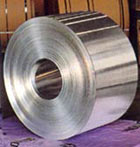We are a very strong industry player
06 November, 2008 | CNBC-TV18
ShareSource : CNBC-TV18
Published on 6 November 2008
Commodity bias has stopped the Aditya Birla Group to always be prepared for a downturn. So, in this volatile economic situation, the company with slowing growth and crashing commodity prices is a somewhat familiar challenge here. But sometimes, poor policy can pickle an already souring situation.
The Group's company Hindalco's Rs. 5,047 crore rights issue devolved two weeks ago. When filed, the rights issue, at Rs. 96 a share was priced at a considerable discount to the market price of Rs. 140. But regulatory processes meant by the time it came to market, the rights price made little sense forcing underwriters to pick up 40 per cent and Mr. Kumar Mangalam Birla to pick up 18.6 per cent more than the promoter's share of 31.4 per cent.
 The issue would have succeeded if Sebi allowed fewer time lags in issue pricing, especially in such market conditions. The rights issue proceeds are meant to refinance one-third of the USD 3 billion debt Hindalco took on to make its audacious USD 6 billion purchase of Novelis, a bet that Mr. Birla still stands by. After all, he just put his money where his mouth is.
The issue would have succeeded if Sebi allowed fewer time lags in issue pricing, especially in such market conditions. The rights issue proceeds are meant to refinance one-third of the USD 3 billion debt Hindalco took on to make its audacious USD 6 billion purchase of Novelis, a bet that Mr. Birla still stands by. After all, he just put his money where his mouth is.
Mr. Kumar Mangalam Birla, Chairman, Aditya Birla Group said, "We have a huge sense of confidence in Hindalco." He thinks that the price was far below intrinsic price; it was lower than what the price would be just given the cash on its balance sheet. "So, we had underwritten the issue to the extent of 40 per cent by the banks at 50 per cent and by us as promoters," he added. He further said, "We did get 90 per cent of the cash that we wanted in the kitty. I've strongly believed that had it not been for the crisis that we suddenly found ourselves in, I think the issue and the price at which the issue happened would've been a huge success."
The diversified Aditya Birla Group also owns Idea Cellular. It is amongst the leading players in service providers domain. According to Mr. Birla, the best years of telecom are over because of increase in the number of players then you had to start with. "It still remains a very attractive business for existing incumbents — those who have a network or are spreading out their network like Idea is and those who are on the cusp of growing up like Idea and that's not a spiel for Idea. But, the new players who intend to come in will find it very difficult to survive in this market."
Here is a verbatim transcript of the exclusive interview with Mr. Kumar Mangalam Birla on CNBC-TV18.
I know that in the rights offer document you had said that you had subscribed up to your portion of the rights and then over and above that all the way up to 50 per cent of the issue, if I understand correctly. Was there an occasion at all at any point where you were willing to maybe purchase more in that rights issue?
We felt that given the new scheme of things, and given the fact that we probably would adjust some of our capex, we felt that going up to the 50 per cent limit that we talked about in the prospectus was good enough for us.
What is it like right now in the middle of so many different projects across your various businesses to be able to find money to fund those projects? What are some of the more unique challenges that you are facing in these last 2-3 months?
For us most of our projects are funded and most of them are work in progress. So, we have very few projects that are yet to be funded.
Having said that, I think for corporates like us, banks have a very huge level of confidence with, I don't see that funding is going to be a problem especially not given what the RBI has been doing these last few weeks.
 With the exception of the Novelis debt refinancing, you are currently not feeling the pinch when it comes to let's say the lack of money to fund any of your existing underway projects?
With the exception of the Novelis debt refinancing, you are currently not feeling the pinch when it comes to let's say the lack of money to fund any of your existing underway projects?
No, not at all. Like I said, all our projects are funded. Wehave got a strong balance sheet. We have got cash on the books. But having said that, the propensity of banks to lend has come down considerably. There is no question about that.
In 2007, if you had an inkling of what was likely to happen in 2008; would you still have done the Novelis acquisition?I think it would have been a matter of timing then. But in terms of the fundamental asset and its intrinsic value, it is huge. The intent was to increase our exposure to the downstream part of the aluminium value chain. The largest part of the downstream business in aluminium is rolled cans. Novelis is the leader of the rolling business in the world.
So, there was no doubt about the fact that this is a business that we wanted, which will add huge value and not just value, maybe not in the next two years but after that. We were very honest when we made the acquisition last year that it would take three years for the acquisition to become accretive.
Yes, because at the time Novelis was stuck with some fixed price contracts.
That is true. All of those fall off from 1 January 2010. But having said that, yes, to get returns has become a little more difficult and it would probably take a little while longer. But fundamentally, I think if we hadn't made an acquisition like that, our investors five years from now would have asked what we were doing? We would have said probably that we were sleeping at the wheel.
So, it is a little difficult to get the timeframe in terms of the investment horizon completely correct between promoters and investors who are not long-term investors. There is no debating the fact that there are people who doubt the value of Novelis. But all that we can do is to communicate, and communicate around the story as to why we bought the asset.
Intrinsically, it is a great buy. We are very happy about it. We would have lost a great value creation opportunity if we had let that go by.
You bought it at a very aggressive price. Even then it was considered very aggressive. It was at a higher multiple than either Hindalco traded or even global majors like Alcan or Alco are traded in EV to EBITDA multiple. I know it is hindsight, but do you sit now and wonder that maybe you could have bid a lower price?It was a competitive bidding situation. I think it is a little difficult to compare apples with oranges because some of the examples that you gave are of companies that have a different product profile.
Novelis gives you fairly steady cash flows with the LME being a pass through, and the EBITDA multiple that we paid were very much in line with industry then.
So, fundamentally going back to the basic question, the crux of the question is, should we have done Novelis and did we do it at the right price at the right time? I think we did.
Had we known that this was going to happen in terms of the financial markets, 2008, we could have maybe timed it better. But then things don't exactly go the way you'd like them to, and you cannot really get your timing perfect. It is not something that was expected. But in terms of the quality of the asset, its intrinsic value, and the value that it adds to the Hindalco story, it is huge.
If in January 2007, you knew what was going to happen in the global markets in 2008, would you have made the Novelis purchase?
The fact is that they wouldn't have waited for us and timed their sell according to our time schedule. So, I would think that, yes, we would. I think that it would have been a bigger stretch; it would have been a very large and much bolder acquisition. But if we really believed in the value of the asset, which we do, I would think yes.
You said that none of your projects underway right now are seeing a fund crunch so to speak because of course you are a huge group and money is not difficult to come by for you at the right price. But the fact is that you have a lot of new capacities that come onstream between this year and the next, both in your cement business and in your aluminium or copper business. So both your commodity oriented businesses see a lot of fresh capacity coming online, all the way up to 15 million tonnes in cement. In both cases, the commodity cycle has gone south completely, prices have crashed. Is it bad timing to have that much capacity come online?
We have about 18 million tonnes coming online by May 2009. We are increasing our capacity from 30 million to 48 million tonnes of cement. But the basic principle that we follow is of being the lowest cost producer. If you really are the lowest cost producer then essentially you are the last man standing.
So, commodity cycles will come and go. You cannot really time your investments exactly as per your expectations of how the cycle will look like. The fact remains that we could have one or maybe at the most two difficulties. But that is what the commodity business is all about, and that is what business is all about in today's environment.
One or two difficulties. What kind of burden does it put on your balance sheet?
I think it doesn't put a burden on our balance sheet at all because we have a very strong balance sheet, and debt to equity, which is practically zero; the fact is that our interest cover is huge. But it does mean that our margins will come down.There is a substantial deterioration in all cement business margins in the last many months now, and it is going to get even worse. Yours is not the only capacity, across industry a lot of capacity is coming onstream?I think the good news in some way is that a lot of capacity that was announced in the cement industry will probably not see the light of day given what is happening in the financial markets around us. So, I don't see that the extent of overcapacity will be as much as was estimated.
Having said that, there is going to be overcapacity probably for the last year or two. Our investment is premised on us becoming the largest player in the cement business. It has actually been the largest expansion ever in Asia by a cement company – 18 million tonnes. I don't think we can play it to the short-term. We've got to have a longer-term vision of where we want the cement business to be. This is very much a part of the strategic architecture of our cement business and how we see it going forward.
But having said that, this is a commodity. You have cycles in the commodity business and you will have maybe one or two difficult years and it is those years that actually separate the boys from the men.
Last year you had a lot of government intervention in cement. What happens in commodity cycles like you pointed out is, yes, there are excessive profits – if I may call it – on the upside. But that helps you weather the downside. That has what has happened with every single commodity business. Steel today is crying about the fact that in the last six months, they were denied profits that could help cushion the next six or eight months or ten months while steel prices continue to remain low. Do you feel that way about cement as well that in some sense this government intervention deprived you of profits that would have been a great cushion as the cycle went down because the cycle would always have to go down at some point in time?I am going to walk around your question a little bit. I think the government intervention per se is not something that is desirable. I don't think that the government intervening in terms of pricing of commodities. I think you've got a free market and a fairly strong market to do that. So, I principally don't agree with the intervention policy of any government.
 Again coming back to the question of being the lowest on the cost curve, I think that is extremely important.
Again coming back to the question of being the lowest on the cost curve, I think that is extremely important.
So you don't grudge the government its interference last year, which was depriving Grasim and Ultratech of some cushion in these difficult times?
I don't grudge it. These things happen. But I don't agree with the policy of intervention.
I want your view on what your commodity outlook is for both cement and metals. Let us start with cement. You yourself have about 15 million tonnes of capacity coming on stream. There is a whole bunch of other capacities coming in from the industry. Prices have been going south or declining for many months now. When do you expect any sort of price recovery in the cement business domestically?
The fact is that when you have large capacity coming on and demand hasn't gone up to match up with that then you would have a difficult one or two-years.
Are you not seeing substantial demand destruction right now because people are saying that housing cut off and the fact that the government has outspent itself with the Sixth Pay Commission - the farm debt waiver - how much money is really going to be there to be able to ahead and implement some of those infrastructure projects - some that have already been accounted for but any fresh investments definitely not happening?
We are not seeing any contraction in demand that's substantial as of now. But I don't rule out the fact that it could happen in the next few months. But like I said that it is a commodity. One has got to live with it. Interestingly, there will be an opportunity to consolidate.
 Do you see Grasim and UltraTech - your cement businesses looking out there for acquisition opportunities with so much capacity coming onstream yourselves already or are you talking about consolidation on a larger level amongst other players in the markets?
Do you see Grasim and UltraTech - your cement businesses looking out there for acquisition opportunities with so much capacity coming onstream yourselves already or are you talking about consolidation on a larger level amongst other players in the markets?
There will be consolidation in the
cement business as a whole. I also think that as a cement company ourselves, there could be opportunities for consolidation, for acquisition. I don't see that happening now but one-year down the line - very possible.
At least two-years, do you expect prices to recover?That's right.
Lets us get your metals out. A few weeks ago you told me you're expecting at least two-quarters of softness in metal prices globally and therefore impacting your businesses. Would you still standby on that or do you think things have gotten worse now?Absolutely. One will have two-quarters of pressure on prices.
Only two-quarters?
The fact is that a large part of commodity price is now a factor of investments by hedge funds and given all of this liquidity crisis, hedge funds have pulled out of commodity funds and given the fact that there is such a huge element of speculation because of hedge funds in commodity prices, one will see and one is seeing commodity prices going down. But if you take the example of aluminium - at current levels of pricing - you have a one-third of the world's capacity that will actually have to shut down because they will start to make cash losses. I don't think that the softness in aluminum will continue for more than two-quarters. And again, if you are the lowest cost producer, if you have got your cost structure right - you will be the last man standing.
 Do you see demand destruction in aluminium as well because in your own Hindalco results yesterday you'll outlined the fact that your seeing Olympic demand from China slowdown and then of course we are talking about facing a possible global recession - both America and across Europe we are seeing signs of contraction?We are talking about a global demand growth of 6 per cent vis-à-vis 8 per cent that we were talking about earlier. But having said, that this is a moving target. We will have to see how things go in the next couple of months.
Do you see demand destruction in aluminium as well because in your own Hindalco results yesterday you'll outlined the fact that your seeing Olympic demand from China slowdown and then of course we are talking about facing a possible global recession - both America and across Europe we are seeing signs of contraction?We are talking about a global demand growth of 6 per cent vis-à-vis 8 per cent that we were talking about earlier. But having said, that this is a moving target. We will have to see how things go in the next couple of months.
Let me talk about your telecom business. It was a difficult quarter for Idea for the kind of investments that they are making in new circles. The telecom business itself seems to be going through a rethink. Most people seem to believe that if you talk prices get any cheaper — it is going to be very difficult for businesses to sustain the kind of phenomenal growth we have seen both topline and bottomline in the past many years. Are the best years of telecom over in this country?
I think you are right. I think the best years of telecom are over because we have so many more players then you had to start with. Having said that, it still remains a very attractive business for existing incumbents - those who have a network or are spreading out their network like Idea is, and those who are on the cusp of growing up like Idea and that's not a spiel for Idea. But I think the new players who intend to come in - they will find it very difficult to survive in this market.
Would you plan to go a little slower in your expansion plans and some capex plans and many of your news circles that you wanted to enter because this is a difficult period and maybe could just sit back watch things unfold and then come back?
As a company we have to take a longer term view and our capex is well funded, we have a very strong debt free balance sheet and the faster we get on with the roll out the faster revenues start to come in and faster we move up in the telecom business. So, I don't think we are contemplating any slowdown in this sector.
What do you think of the Unitech deals, the USD 2-3 billion valuations of companies that have just cut in spectrum a few months ago, does it bother you that these companies are able to attract such valuations without even have to build in the telecom business?
It's great news for someone like us because if you have new companies, which only have licenses that command a value that they do then a company like Idea should have doubled or trippled its valuations, so it's a good benchmark for companies like Idea in terms of valuations.
You haven't spoken publicly of what you think of this entire spectrum situation we have got into?
If it is a transparent process whatever process it may be, that will be fair.
So you agree with the whole auction process?
I think it's transparent and fine and I don't think it's the ideal situation to be in but that's the situation in which we can live in.
So you were okay with the 2G or now the way 3G spectrums are given away?
That's something from the past.
But it skewed the dynamics of the telecom business?
Yes, but the next important thing is going to be the auction of 3G and that is one important point going forward.
So you don't want to talk about the 2G policy because many telecom players are incredibly bitter about it, but it was unfair according to many and it deprived existing telecom business that actually consumers needed?
That has happened and you have to live with it and can't rewind it.
So you don't have a view on it?
I think the view doesn't matter and you can have view on lot of things but the fact is that water has flown under the bridge, we are where we are and we have to make the best of the situation and I think Idea is in a great situation.
Do you think 3G auction will be delayed considering that finding funds to be able to build in that are going to be a little difficult at this point in time?
Yes, given the liquidity situation and maybe it's not practical to have an auction at this point in time but as soon as this liquidity issue is behind us and as far as we are concerned, we are pretty comfortable.
 If they did have it now, what would it mean for Idea because you say that most of your expansion already funded, this auction could really put you under pressure?
If they did have it now, what would it mean for Idea because you say that most of your expansion already funded, this auction could really put you under pressure?
We have a debt free balance sheet. So, ifliquidity is not a problem for banks as a whole and not specific to Idea and we would have a very little problem in funding the acquisition.
Would it be fair to say that the majority businesses are the bigger ones in your group are all suffering a downturn at the same time?
This is the moment of truth and this is the time where men actually get separated from the boys and there is no going away from the fact that everyone is facing these issues to some extent or another and it's important to see how all of us come out of it and then it will look very good.
The other business is the financial services business which is most impacted in the last 3-4-6 months; you were at one point trying to reform this business give it higher profile and grow it faster, these last months were considerable setback for that?
It's not about profile but it has been about more power to the financial services business, so from what I know and what I can see the redemptions have been far lower than a lot of the other players and again I think it will come out pretty good and we would have moved up in the order, we would have moved in the order at the end of this crisis of financial services.
Did the last 3-4 months set you back in terms of your financial services branch?
We would have liked to grow much faster and our plans are much more aggressive but that was when the world hadn't changed.
This is the market which is tempting many promoters to increase their stake for variety of different reasons, stocks are incredibly cheap, and you want to provide some floor level to that and you want to tell investors to have some confidence and SEBI has gone ahead and facilitated that route by removing the open offer trigger at 55 per cent and taking it all the way to 75 per cent, is this the time that you would like to go out and buy more shares in many of your group companies?Yes it's a great time for us to buy the stock. We are in any case are assuring up a holding and I think these levels of pricing are fast forward at times and I think its going to be very difficult to find stocks at these prices going forward. Sebi's move has been great and I don't think it will help the current situation very much because most promoters are not in the 55 per cent limit and since the creep limit is kept at 5 per cent, I am not sure it will help prices go up in this current phase but if the creep limit may also be increased to 10 per cent, this will help the situation as of now.
Give me a sense of how much would you like to keep the promoter's stake to in your 3-4 peak companies?
Given the current environment, the ideal promoter holding situation it should be more than 50 per cent.
And if the creep limits so allows or depending on the time it takes within this creep limit, would you like to take your limit over the 50 per cent in the next few years?
As of current environment, it makes a lot of sense and that will give a lot of comfort to investors and promoters and there is no reason why you wouldn't want to see your holding at 50 per cent.
So is it fair to assume that you are right now a buyer in Hindalco, Grasim and your company stocks?
It's a great time for us promoters to buy such stocks and we will be buying them forward.
Do you have trouble finding finances for your purchases, you did a rights issue now and you already spent substantial amount of money subscribing. There are many promoters who are not able to exit their current promoter holding and money is not available to go out there, so do you have enough money right now to go out there and substantially buy a stock?Honestly, I don't have all the money for this situation but going forward in the next couple of weeks, liquidity positions will ease especially for companies like us and I think that will be the time to go out and start buying in markets.
What do you think of what the government can do or regulators like Sebi can do to make the current environment a little easier for businesses to be able to get through this entire difficult period?
The only thing they can probably do is respond more proactively and faster, so if you actually announce an initiative for a policy on day five, you could probably do it on day two but honestly I don't think it is much more that one should expect and I don't think there is much more that they can do.
What was the worst moment in the last 3-4 months?
It was one evening when we saw very large redemption pressure as did all other mutual funds but we are very strong industry player with strong fundamentals and very high credibility.






